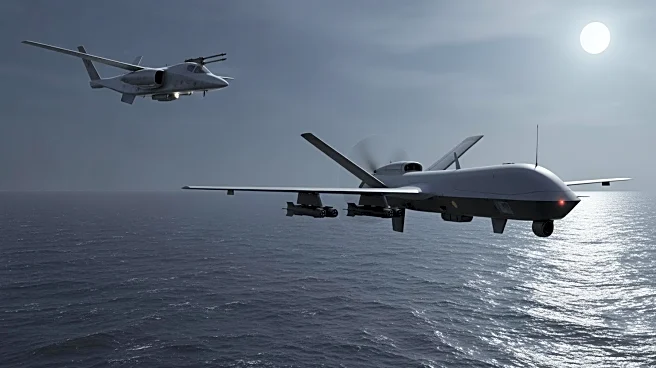What's Happening?
The U.S. military has initiated a campaign targeting alleged drug trafficking boats in the Pacific Ocean and Caribbean Sea. This operation involves the use of various military assets, including MQ-9 Reaper
drones, AC-130J gunships, and fighter jets. The MQ-9 Reaper drones, known for their precision and armed with Hellfire missiles, have been primarily used in these strikes. The Pentagon has not publicly disclosed the specific aircraft or hardware involved in the operations. Since September, the military has conducted 19 strikes, resulting in the destruction of 20 boats and the death of 76 individuals. The campaign aims to curb the flow of drugs into the United States, with military assets concentrated in Puerto Rico and El Salvador. The U.S. Southern Command and Special Operations Command are collaborating on targeting, with input from the intelligence community.
Why It's Important?
This military campaign is significant as it represents a strategic effort by the U.S. to combat drug trafficking, which poses a substantial threat to national security and public health. The deployment of advanced military technology, such as drones and gunships, underscores the seriousness of the issue and the resources committed to addressing it. The operation could potentially disrupt drug supply chains, impacting cartels and criminal organizations involved in narcotics trafficking. However, the campaign raises questions about the cost to taxpayers, with each strike reportedly costing hundreds of thousands of dollars. Additionally, there are concerns about the accuracy of targeting and the identities of individuals on the vessels, which could have legal and ethical implications.
What's Next?
The U.S. military is expected to continue its operations against drug trafficking boats, with additional assets, including the Ford Carrier Strike Group, moving towards the Caribbean. This deployment may enhance intelligence gathering and support counternarcotic operations. However, the presence of significant military assets in the region has led to speculation about potential future actions, such as strikes against Venezuela. Lawmakers are seeking clarity on the campaign's costs and effectiveness, and further briefings to Congress are anticipated. The ongoing operations may lead to increased scrutiny and debate over U.S. military involvement in counternarcotics efforts.
Beyond the Headlines
The campaign against drug trafficking boats highlights broader issues related to U.S. foreign policy and military strategy in Latin America. The use of military force in counternarcotics operations raises ethical questions about sovereignty and the potential for collateral damage. Additionally, the focus on drug trafficking routes from Colombia to Mexico reflects geopolitical considerations and the complexities of international drug trade dynamics. The operation may influence U.S. relations with countries in the region, particularly those implicated in drug trafficking activities.









